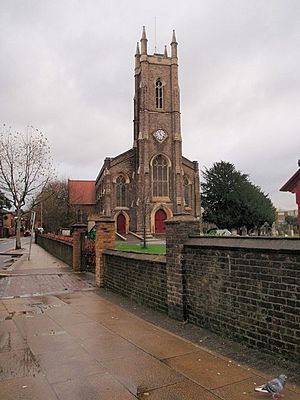St Nicholas, Tooting Graveney facts for kids
Quick facts for kids St Nicholas, Tooting |
|
|---|---|
 |
|
| OS grid reference | TQ 27888 71130 |
| Location | Church Lane, Tooting Graveney, Greater London, SW17 9PP |
| Country | England |
| Denomination | Church of England |
| History | |
| Status | Active |
| Architecture | |
| Functional status | Parish church |
| Administration | |
| Parish | Tooting Graveney |
| Archdeaconry | Archdeaconry of Wandsworth |
| Diocese | Diocese of Southwark |
St Nicholas, Tooting Graveney, is a Church of England parish church located in the heart of Tooting, a busy area in London, England. It is a place where people gather for worship and community events.
Contents
History of St Nicholas Church
The story of St Nicholas Church goes way back to the Saxon period, which was a very long time ago in English history. The church is even mentioned in the Domesday Book of 1086. This book was a huge survey ordered by William the Conqueror to record everything in England.
Building Changes Over Time
The first church building was changed and made bigger many times. It kept its special round Saxon tower for a long time. But by 1814, the church was too small for all the people who wanted to attend. So, it was decided to build a new church nearby.
This new church was built between 1832 and 1833. The architect who designed it was Thomas Witlam Atkinson. Later, during the Victorian era, the new building was also made larger.
A Protected Building
Since 1955, St Nicholas Church has been a Grade II listed building. This means it's an important historical building that needs to be protected. The church's old records and documents are kept safe at the London Metropolitan Archives.
St Nicholas Church Today
St Nicholas's is still a very active church in the local community. It holds church services every Sunday. These services take place at 10:30 in the morning and 6:00 in the evening.
Notable People Connected to the Church
Over the years, many interesting people have been part of St Nicholas Church.
John Buxton Marsden
One notable person was John Buxton Marsden. He served as the rector, which is like the main priest, from 1833 to 1844. He was also a well-known cleric and historian.
 | John T. Biggers |
 | Thomas Blackshear |
 | Mark Bradford |
 | Beverly Buchanan |

